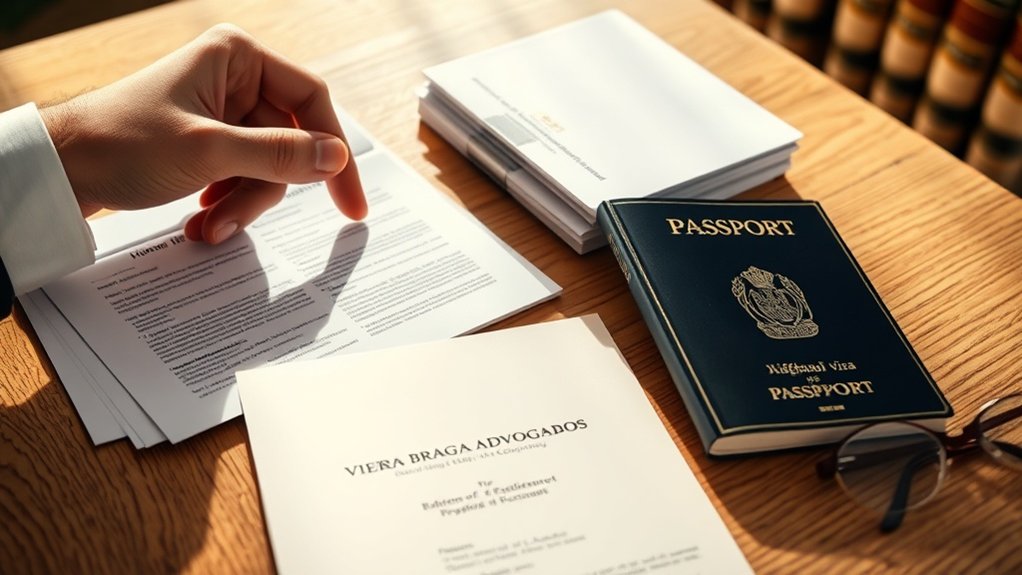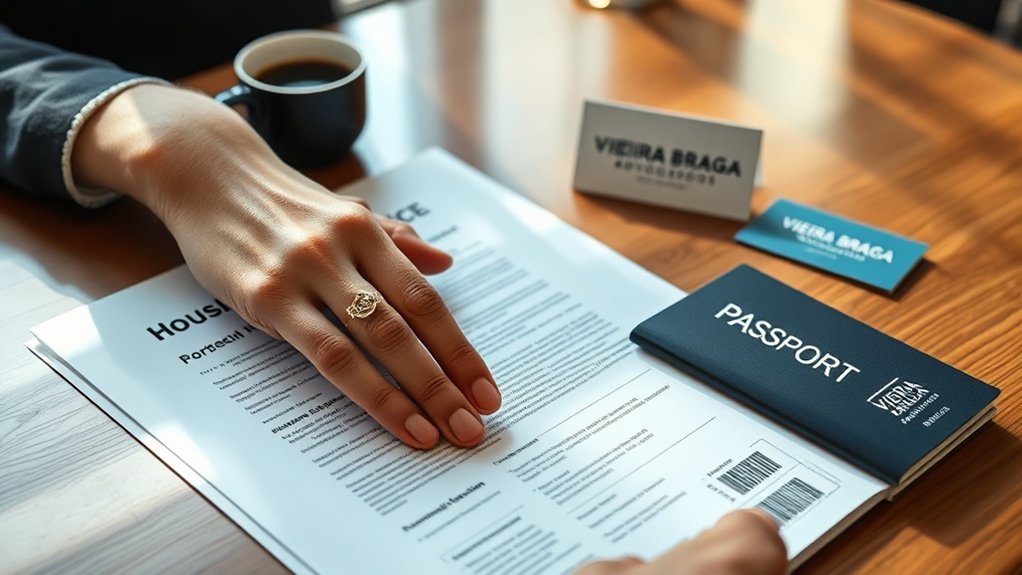If you’re an Afghan national trying to secure residency in Portugal, housing contracts and proof of residence can quickly become a challenge. You need more than just a signed lease; the documents must meet strict requirements and match your application details exactly. Even small errors or inconsistencies may slow down the process. So how do you navigate these hurdles and avoid costly setbacks? The expertise of Vieira Braga Advogados could make all the difference.
Understanding Housing Contract Requirements for Afghan Nationals

When you’re preparing to file important documents as an Afghan national, it’s crucial to understand what’s required for your housing contract. Authorities often use your place of residence to verify your eligibility for various legal processes, so your contract plays a vital role. You’ll need to ensure that your housing arrangements meet specific administrative expectations before starting your application or documentation process.
Start by confirming your housing contract is recognized by local authorities. This means you should have a contract that clearly lists your name and proper address details. If you’re renting, make sure your landlord has properly signed and dated the agreement. Don’t rely on informal arrangements or verbal agreements; officials typically want written documents that demonstrate your long-term residence. Having a clear, traceable contract helps streamline your filings and avoids unnecessary complications. Prioritize securing and maintaining an up-to-date, legitimate document—this diligence supports your application’s success.
Remember that specialized legal support is recommended to ensure your housing contract meets the standards required by immigration authorities, helping you avoid errors that could delay or jeopardize your application.
Key Elements Needed in a Valid Housing Contract
When preparing your housing contract, you’ll need to make sure it includes all essential details like names, dates, and rental terms. Clearly list every occupant and verify their identification. To meet legal recognition requirements, confirm the contract is properly signed and follows local regulations. Seeking advice from a qualified immigration lawyer can help you avoid costly bureaucratic errors during the documentation process.
Essential Contractual Information
Although housing contracts can look different across locations, you’ll always need certain key elements for a contract to be valid and accepted for Afghan filings. To make sure your contract stands up to scrutiny, you must include very specific details. Without these, your application could face delays or outright rejection. You want your document to clearly define the rights and responsibilities of both parties, minimize misunderstandings, and serve as solid proof of residence.
Pay special attention to these essential elements:
- Property Description: Clearly identify the address and characteristics of the residence.
- Contract Duration and Terms: State when the agreement starts and ends, plus renewal or termination conditions.
- Signatures of Parties: Ensure both landlord and tenant (or all co-signers) have signed and dated the contract.
Double-checking these points can save you major issues later. Many U.S. immigration procedures require proof of residence as part of the required documentation to establish eligibility.
Identification of Occupants
In addition to outlining the property and contract terms, you also need to clearly state who will actually live in the residence. Each occupant’s full name, date of birth, and, if possible, identification numbers should appear in the contract. Don’t just include the primary tenant or leaseholder—be sure to list all family members and anyone else who will stay there consistently. This level of detail helps prevent misunderstandings and ensures that everyone’s presence is officially recognized. If you’re filing paperwork for Afghan documentation purposes, immigration authorities will expect this information to match what applicants provide elsewhere. By identifying every occupant in the contract, you strengthen your proof of residence and minimize the risk of complications during document review. Always double-check for accuracy before signing. For further assurance, working with an experienced attorney can help ensure your housing contract meets all the necessary legal standards and reduces the likelihood of errors that could affect your application.
Legal Recognition Requirements
To ensure a housing contract is legally recognized for Afghan filings, you must include specific key elements that establish its validity. Every valid contract should clearly outline the parties involved, the property details, and the rights and responsibilities of each side. Without these details, your document may lack legal standing and won’t support your proof of residence claims.
You should pay close attention to the following:
- Full identification for all parties: Names, passport or ID numbers, and contact information of the occupant and property owner.
- Comprehensive property description: Exact address and defining features that make the property identifiable.
- Signatures and dates: All parties must sign and date the contract for it to be binding and recognized by relevant authorities.
Including these elements solidifies the contract’s legal credibility. Additionally, working with an immigration lawyer in Brazil can ensure your documentation meets current legal standards and increases the chances of approval in your immigration process.
The Importance of Proof of Residence in Legal Filings
When you’re submitting legal filings, proof of residence helps meet strict recognition requirements and supports your case. You need to make sure your documents are authentic and match up, since authorities will check for consistency in your address details. Without solid proof, you could face delays or even rejections. For guidance on ensuring all your documents fulfill the necessary standards, consider seeking help from professionals with expertise in immigration regulations.
Legal Recognition Requirements
Although many legal processes might seem daunting, you’ll often find that proof of residence stands at the core of successful Afghan filings. For your documents to hold weight legally, you must understand the specific legal recognition requirements. Courts and authorities demand proof that ties you to a physical location, safeguarding the integrity of the process. You can’t just submit any document—only certain forms meet strict criteria. Typically, legal recognition depends on:
- Official documents (like utility bills or lease agreements) listing your name and address
- Proper issuance by recognized agencies, ensuring documents aren’t self-generated
- Recent dates to show your current and continuous residence
Meeting these criteria boosts your filing’s legitimacy and ensures your application remains in good standing with legal authorities. For even greater legal security, professional support from an immigration lawyer can help you navigate these requirements and avoid complications.
Verifying Document Authenticity
Understanding the criteria for legal recognition sets the stage for another key step: making sure your documents are genuine and accepted by authorities. If you’re presenting a housing contract or proof of residence for Afghan filings, proper verification is crucial. You shouldn’t just submit any document—officials expect to see originals or certified copies, clear signatures, and sometimes tax or utility details. Double-check that every page is complete and that nothing has been tampered with. Immigration lawyers can also help ensure your documents meet regulatory compliance requirements to avoid unexpected delays or refusals.
Here’s a quick guide to what’s usually checked:
| Aspect Checked | Why It Matters |
|---|---|
| Official Stamp/Seal | Confirms authenticity |
| Signature Verification | Links signatory to the document |
| Valid Dates | Proof of current residence |
| Unaltered Information | Prevents document fraud |
Don’t overlook thorough validation—small mistakes can cause big delays.
Address Consistency Challenges
Because matching addresses across your documents is essential, even small discrepancies can raise red flags and slow down your application. When authorities review your Afghan filing, they’ll scrutinize details for any inconsistencies. If one document lists “Apt. 2” and another says “Apartment 2,” that minor difference could trigger questions or delay your process. You need to make sure everything aligns perfectly to prevent unnecessary headaches and requests for clarification.
Pay close attention to the following when preparing your proof of residence:
- Double-check spelling, abbreviations, and formatting for every address line.
- Update all supporting documents if you recently moved or changed household details.
- Keep copies of leases, utility bills, and official correspondence for quick reference.
Staying vigilant with address consistency boosts your application’s credibility. In Brazil’s immigration process, the National Migratory Registration Card serves as essential proof of status and relies on accurate, consistent addresses across all your documentation.
Challenges Faced by Afghan Nationals in Securing Residence Documentation
Despite efforts to streamline the process, Afghan nationals often encounter significant barriers when trying to secure valid residence documentation. You may find local authorities require extensive paperwork that’s difficult to obtain from your home country. Language barriers can make communication tough, leading to misunderstandings about required documents and deadlines. If you don’t have a traditional lease, it’s harder to show stable housing, which authorities often expect. Many landlords hesitate to formalize rental agreements with newcomers or refugees, and without these contracts, your path to legal residence can stall.
You also face bureaucratic delays, especially when requesting supporting documents from both Afghan and Portuguese authorities. If your status in Portugal is temporary or you’re waiting for asylum decisions, you might struggle to meet evolving legal requirements. It’s easy to feel overwhelmed by changing rules and uncertainty about your future, making the task of proving your residence even more stressful and complicated. Seeking specialized guidance for individuals can provide crucial assistance and improve your chances of successfully navigating these challenges.
Step-by-Step Guide to Obtaining a Housing Contract in Portugal

These challenges may seem discouraging, but you can take practical steps to secure a housing contract in Portugal. Start by identifying your options: you can rent directly from landlords, use real estate agencies, or search online platforms. Begin with a clear idea of your budget and preferred location. Once you find a suitable property, always communicate directly with the landlord or agency, and don’t hesitate to ask for all terms in writing.
Here’s how you can streamline the process:
- Research available properties online or through local contacts to compare prices and locations.
- Prepare your documents, such as a valid ID, proof of income, and any references, as landlords often require these.
- Visit the property before signing; confirm details about rent, deposit, and contract duration.
How Legal Support Simplifies the Process
With the complexities of Portuguese housing contracts and legal terminology, having legal support can make every step smoother and more secure. When you work with a legal professional, you’ll quickly understand what’s required for a valid contract and proof of residence. Lawyers can explain all terms in simple language, review your documents for accuracy, and ensure that you’re complying with local regulations.
You won’t have to worry about missing essential clauses, incorrect information, or misunderstandings with landlords. Legal experts will act as your representatives, negotiating on your behalf for fair terms. They’ll also confirm that all signatures, declarations, and ID copies adhere to SEF requirements for Afghan filings.
Common Mistakes and How to Avoid Them

While navigating Portuguese housing contracts, you might make several common mistakes that could delay or jeopardize your Afghan filing. It’s easy to overlook key details, especially if you’re unfamiliar with local requirements or documentation standards. One common error is signing a contract that doesn’t meet SEF (Serviço de Estrangeiros e Fronteiras) proof of residence criteria. Another issue is providing incomplete housing documentation, which can quickly halt your application. Lastly, discrepancies between your contract details and official identification could raise red flags and delay processing.
To help avoid these pitfalls, remember to:
- Verify all the details: Check that names, addresses, dates, and signatures match your official documents.
- Confirm contract validity: Make sure your contract follows SEF standards—ask for clarification if you’re unsure.
- Keep copies and receipts: Retain signed contracts and proof of payment to support your application.
Paying attention to these aspects boosts your chances of a smooth filing.
Benefits of Partnering With Vieira Braga Advogados
Because navigating housing contracts and SEF requirements can be complex, partnering with Vieira Braga Advogados streamlines your Afghan filing process. You’ll have direct access to legal expertise that saves you time and reduces stress. Their team knows exactly what documents SEF expects, preventing lost applications or unnecessary delays. Instead of juggling housing paperwork and unfamiliar bureaucracy alone, you can rely on professionals who advocate for you every step.
The peace of mind and practical help Vieira Braga Advogados offers goes beyond documentation. Here’s what their support means for you:
| Peace of Mind | Efficiency | Confidence |
|---|---|---|
| Less paperwork | Faster processing | No missed details |
| Trusted guidance | Fewer obstacles | Secure applications |
| Clear answers | Reduced stress | Expert oversight |
| Constant support | Time saved | Results you trust |
With Vieira Braga Advogados, you won’t face this journey by yourself—you’ll move forward with certainty and confidence.
Frequently Asked Questions
What are the four main types of contracts?
They are fixed-term, indefinite, for services, and for work/project, each with different obligations and durations.
Where to find housing contracts in UCLA?
Housing contracts can be found on UCLA Housing & Hospitality Services’ official website or at the campus housing office.
How to get out of FSU housing contract?
Students can request cancellation through the FSU Housing portal, usually requiring documentation of withdrawal, relocation, or extenuating circumstances, and may incur fees.
How to cancel housing contract in UARK?
Cancellation at the University of Arkansas requires submitting a formal request to University Housing, providing justification, and following specified deadlines and financial policies.
How Long Does the Application Process Typically Take for Afghan Nationals?
You can typically expect the application process to take anywhere from several weeks to a few months, depending on the specific requirements and the volume of applications being processed. Make sure you have all the required documents ready, as delays often happen if paperwork is incomplete. Communicate promptly with authorities and respond quickly to any requests for additional information, as your responsiveness can help speed up the process and avoid unnecessary setbacks.
What Documents Are Needed Besides a Housing Contract for Afghan Filings?
You’ll need more than just a housing contract. Be ready to provide your Afghan passport or identification document, proof of entry into the country, and recent passport-sized photographs. You should also gather proof of income or financial support, birth certificates for yourself and accompanying family, and sometimes vaccination records. If you’ve got marriage or education certificates, bring those, too. Double-check local requirements, as they can vary by jurisdiction or processing office.
Are There Any Associated Government Fees for Filing Proof of Residence?
Yes, you’ll usually need to pay certain government fees when filing proof of residence. These fees can vary depending on your local authorities and the specific type of document you’re submitting. You should check directly with the relevant government office or official website to find out the exact amounts. Be ready to pay either online or in person, and remember to keep all receipts as part of your application process.
Can Family Members Be Included in the Same Housing Contract Application?
Yes, you can include family members in the same housing contract application. You’ll need to list each family member’s details and provide identification documents for everyone. This approach makes the process simpler, keeps your household’s information together, and helps with proof of residence requirements later. Just make sure everyone’s names are clearly stated in the contract so their residency is officially recognized, which can be important for other legal or administrative processes.
What Are the Options if Housing Contract Paperwork Is Lost or Stolen?
If your housing contract paperwork gets lost or stolen, you should contact your landlord or housing provider right away to request a copy. Most landlords keep records and can provide duplicates upon verification. You can also check if you have digital copies in your email or cloud storage. If necessary, you might need to file a police report to officially document the loss, especially if the paperwork contained sensitive personal information.
Conclusion
When you’re navigating housing contracts and proof of residence for your Afghan filings in Portugal, don’t underestimate the process’s complexity. With Vieira Braga Advogados by your side, you’ll avoid common mistakes, ensure your documents are flawless, and overcome bureaucratic hurdles efficiently. Their expertise takes the stress out of residency requirements, giving you peace of mind and a clearer path forward. Trust their guidance so you can focus on settling into your new life with confidence.


